Peter MALONE
Missing/ 2023
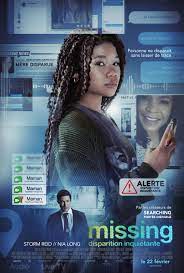
MISSING
US, 2023, 111 minutes, Colour.
Storm Reid, Nia Long, Tim Griffin, Ken Leung, Amy Landecker, Megan Suri, Joaquim de Almeida, Daniel Henney,
Directed by Nicholas D.Johnson, Will Merrick.
For audiences who enjoy a thriller with twists, there is much to satisfy as well as mystify in Missing.
In the past, it has been helpful for reviewers to make a distinction between “what” is presented and “how” it is presented. This is often useful for assessing moral perspectives of the film and its treatment of contentious issues.
However, it is quite important for this film. The “what” is the thriller plot. The “how” is the style of the storytelling, the focus on IT, the fact that the audience for almost 2 hours, looking at the big cinema screen, is actually looking at computer screens, phone screens, surveillance footage, television news… This means that the action is limited as to what can be brought into the plot to utilise the technology. And, certainly, this it does. Which means that computer-savvy younger audiences might take a lot of this for granted, relishing it, identifying with it, discovering possibilities for their own use and explorations. But it also means that the older demographic, especially those who are less computer literate, may be quite bewildered but also intrigued.
In 2018, two writers, Aneesh Changanty and Sev Ohanian wrote a thriller called Searching, a thriller about an investigation, filming computer and phone screens through the whole film. It was praised for its style. Changanti directed. This time the two have come up with the plot, obviously similar to Searching (and also for their 2020 thriller, Run, a drama about conflict between mother and daughter). However, this time the film has been directed and written by the team of Nicholas D.Johnson and Will Merrick. In their stories, Searching and Missing are more mainstream entertainments than a number of recent horror films who also delve into this IT way of telling tales.
For the less technologically initiated, it is amazing to watch the central character, June (Storm Reid), aged 18, at her computer, seen going to the airport to meet her mother returning from a trip to Colombia, and her not returning, and the audience becoming more involved with her searching, finding the hotel, trying to check out the surveillance footage, hiring an investigator in Colombia, making contact with the embassy, with the FBI, with the police. Her fingers move quickly over her keyboard but also touching her screen, the range of icons, bringing up views of the foreign country, linking into websites, typing English onto her screen and clicking for instant Spanish translation, going into all kinds of websites, bank accounts, using a range of passwords, and finding video data on dating sites.
Which means that there is no lack of action in the film, but we watch it on the variety of screens. Even action within the screen is devised so that there are reflections, angles, so that it is not simply June sitting at her computer.
In fact, initially there are a couple of surprises. Then there is a twist. Then there is another twist. And yet another, keeping the audience puzzled and interested.
Most of us would not like all our films, all our thrillers, to be filmed in this way – we need breathing space and the camera having room to move. However, in its way, Missing is quite successful.
- The direct title? Audience enjoyment of the abduction plot? Thriller conventions? Plot twists?
- Start of the film, IT, computer screens, phone screens, surveillance cameras, television news? The audience spending the time watching screens on the big screen? The effect the concentration? The effect of the limits of the screens, action within the screens? The musical score?
- Computer literacy, the younger generation, June at 18, her expertise, fingers over the keys, the various icons, making connections, bringing up instant translations, international connections, views of international locations, connecting with the police, the FBI? The impact for the younger audiences, identification? For older audiences, mixture of admiration and bewilderment?
- The introduction to June, her mother and father, the videos, the bond between father and daughter, his bleeding nose, this being clipped from the video archive? The impression for the audience on father and family relationships?
- 10 years later, June as a typical teenager, reacting against her mother, Junebug, her mother and her demands? Her mother and the relationship with Kevin, the outings, June’s reaction? The decision to go on a trip to Colombia? The relationship between Kevin and the mother, love?
- The mother not returning, June waiting at the airport, her concern, going online, the details of the online investigation, the advertisements for investigations in Colombia, Jave at eight dollars an hour, talking with him, the commission, the relationship between them, his bike, going to the hotel, searching the shops, finding the lock? The story of his son’s alienation? June and her response, the bad response, later contacting him?
- Connections with the hotel, language issues, bringing up translations on her screen, issues of surveillance cameras and reusing them, with the FBI, the Embassy in Colombia, the timing, efforts made, investigations, legislation, FBI and Colombia and limitations?
- The details of going into websites, dating websites, bank accounts, passwords, getting video? The plot developed by the sequences from dating websites?
- June, her friend, Veena, the help? Tracking down Jimmy, his story about Kevin, the discovery of Kevin’s record, the conman and women, Rachel, her disappearing from her job for two weeks? Then the footage of Kevin and her mother, on the bridge, the proposal? Her going to the vehicle, the abduction, the game?
- The various twists satisfying thriller fans, the role of the mother and the abduction, engineering, Kevin’s role, then his being shot at the border, the discovery of Rachel returning, her being in the video substituting the mother? The mother still in LA? The friend, contact with her, investigations, June going to her office, her death?
- The mysterious background of her mother, no records? Then the arrival of her father at the door, she thinking he was long dead? The revelation about his being in prison, the contact with Kevin?
- The father, his drug background, prison, release, the mother, in hiding, taken, confined, the father taking June? Reunited with her mother? The mother shot, stabbing her husband? 911, the police, ambulance?
- The unravelling of the truth, the husband seeking mother and daughter for 10 years, his motivations?
- The resolution, happy ending? And Jave and his son reconciled in Colombia?
Fisherman's Friends - One and All
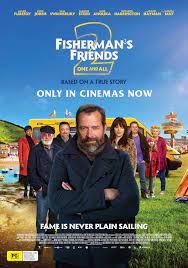
FISHERMAN’S FRIENDS – ONE AND ALL
UK, 2022, 111 minutes, Colour.
James Purefoy, Sam Swainsbury, Dave Johns, Maggie Steed, Imelda May, Meadow Nobreda, Richard Harrington, Jade Anouka, Joshua McGuire, David Heyman, Ramon Tikaram.
Directed by Meg Leonard and Nick Moorcroft.
Anyone who does not get roused by the sea shanties must be tone deaf! They definitely have an appeal across the ages.
And this was certainly true with the original film, Fisherman’s Friends, in 2019. It was based on an actual group of singing fisherman, their local singing in Port Isaac, Cornwall, their being taken up by a record company, and their first album. Not without the usual business difficulties.
At the heart of the group was the older man, Jago, played quite endearingly by David Heyman. But, he dies. (But this does not prevent him reappearing in this sequel, seen by his son Jim, encouraging, singing along, some criticism, urging Jim to better his life.)
This film opens with the Fisherman’s Friends finishing a national tour, the opening credits naming all the towns with some vistas all over Britain. But, once at home, everything returns, more or less, to ordinary life, Jim (James Purefoy) out on his boat, tentatively alone, the various men working at the fish market, the young Rowan managing the bar with his wife. And, there is the powerful presence of Maggie, the matriarch (good to see Maggie Steed with the decades-old memories of TVs Pie in the Sky). And there is more than competent granddaughter, Tamsin (Meadow Nobreda).
Meanwhile, in London, there is the record company, an agent, Leah (Jade Anouka) eager to negotiate a second album, the underling from the office, Gareth (Joshua McGuire) always putting his foot in it, the butt of jokes. And the boss is severe.
The first dramatic question arises: the need for another voice now that Jago is dead. Jim is against it. However, mother and granddaughter organise auditions (some funny moments with a variety of would-be fisherman, Gilbert and Sullivan, Village People…). But one stands out, Morgan (Richard Harrington) a Welsh farmer who has moved to Cornwall. Everybody is enthusiastic – except Jim who later humiliates Morgan in public. Everything over?
This is the kind of tale that appeals to a wide audience, but generally older. So, a romance is introduced, an Irish singer who has ruined her career, recovering alcoholic, Aubrey (Imelda May) whom Jim is rude to but there is a mellowing. But, also some dramatic heightening introduced, a mine accident involving Maggie and granddaughter, and tension in a rescue.
So, what is left? Of course, rehabilitation, the possibility of a new album, a concert appearance. And we all enjoy this because the fisherman’s friends, with apologies from Jim to Morgan (the one and all of the title), go to London to confront the executives in a restaurant, singing heartily and engaging all the diners. And, Maggie has concocted a scheme where the group has the possibility of appearing at… But that would be a spoiler!
There is a pleasure of seeing the actual members of the group during the final credits, seen in buses, seen performing at… Once again avoiding the spoiler!
- For audiences who enjoyed the original film? The sea shanties? The singers, fishermen, Port Isaac, the Cornwall ethos, the landscapes, the seascapes and cliffs, and aspects of British life? For audiences who are meeting the Fisherman’s Friends for the first time?
- Port Isaac, the views from the sea, the waters, the cliffs, the walks and the peaks? The town itself, the wharves, fish market, homes, bars? The feel of the town?
- Meeting the singers again, especially Jim, Rowan and his wife, Led Ville? Maggie, the matriarch? Tamsin, the granddaughter? The death of Jay go? Living memory?
- The tour, the travelling, the performances, the first album, celebrities? And the range of songs inserted throughout the film?
- The return to normal, back fishing, work? The bed-and-breakfast, the bar?
- The recording company, Leo is the contact, Jez as the severe boss, Gareth, eager, putting his foot in it, the butt of jokes? This is to port Isaac, the phone link up for the meeting, Led Ville and the toilet, jokes on him?
- Jim, his relationship with his mother, grieving his father, his father constantly appearing throughout the film, singing, encouraging, criticising? Jim a sullen, drinking, enjoying the fishing, the bond with Temps and, wary of the move for a second album?
- Maggie, enthusiastic, memory of Jay go, the bed-and-breakfast, Aubrey and her wanting to change rooms, Jim rude to her? Encouraging the group, arranging the auditions, Temps and in charge, the comedy of the various auditions and the range of songs from shanties to Gilbert and Sullivan and the Village People? Morgan, his voice, everyone joining in? Jim, anger at his being a farmer, not fishermen?
- The paparazzi, photography, wanting to catch people in awkward moments, Jim providing them, the later experience with Aubrey and her career?
- The concert, the introduction, the open air performance, gs, Jim and his insulting Morgan, the reaction of the crowds? The cancelling the contract?
- Jim, morose, the encounter with Aubrey, her reaction, the challenge, is walking up the hill, her house, her invitation, talking, the breaking of barriers, the relationship, moving in, his mother wary, coming with Temps in, Jim taking Aubrey on the boat? A romantic interlude?
- The accident, Maggie and temps and, the details of the rescue, Jim climbing down, pulling his granddaughter to safety? The Coast Guard? Hospital? Maggie recovering and released?
- Maggie, the plan, the friend in Australia, sending the lobster, the record? The suggestion about Glastonbury?
- Leo, the visits, exasperation is, phone calls? Gareth, the tide coming in, everybody laughing?
- The invitation to Glastonbury? The group going to London, going to the restaurant, the performance, the response, jeers and the contract?
- Going to Glastonbury, the crowds, celebrity, beyond say, her husband, the performance and the reception? Everybody happy? Jim, Jago appearing, singing with him, then vanishing?
- The enjoyment of the credits with the real fisherman’s friends, in the bus, going to Glastonbury, performance?
Amazing Spiderman, The
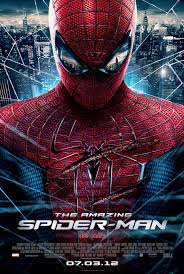
THE AMAZING SPIDERMAN
US, 2012, 136 minutes, Colour.
Andrew Garfield, Emma Stone, Rhys Ifans, Denis Leary, Martin Sheen, Sally Field, Campbell Scott, Embeth Davitz, C.Thomas Howell, Irfan Khan.
Directed by Marc Webb.
Lots of pre-publicity for this ‘re-booting’ of the Spiderman franchise. Tobey Maguire did his dash in three Spiderman movies between 2002 and 2007, all very successful. So, the question does arise, why a new round of Spiderman films so soon? One of the answers is that this version gives more background to Peter Parker and his family than the previous films. It is likened to Batman Begins, giving new life to Christopher Nolan’s trilogy of Dark Knight blockbusters. But, Peter Parker’s origins are far less dramatic and spectacular.
We see Peter as a little boy when his parents suddenly disappear after entrusting him to his uncle and aunt (Martin Sheen and Sally Field). Then we find him as a student in his final year at High School, a rather diffident young man, of kindly disposition, looking a bit of a nerd – but he defends students from bullies and wins the sympathy of Gwen Stacey, popular at school (Emma Stone). So far, so ordinary enough, with Andrew Garfield creating a new image of Peter Parker which we are able to accept pretty soon.
Peter is a wiz at science as was his father whose satchel and papers he finds. He also tracks down his father’s science partner (Rhys Ifans – who used to be a Notting Hill lout but has become a serious actor, as with his Earl of Oxford in Anonymous). Visiting the high tech lab of spiders for cross species experiments, he is bitten by a spider – and we know what happens. His turning into Spiderman is presented more realistically as he studies spider bites on line, develops a strong cable… But, his discovery of his superhuman strength is played for some welcome broad comedy.
Once Peter gets into action as Spiderman and designing and making his costume, the film flattens out a bit, not that there is not a lot of action. But, the film does show how his first motivations are selfish (as he is warned by Uncle Ben) and an enjoyment of his powers. Then he starts helping people – and the police chief (Denis Leary, sardonic as usual) brands him a vigilante. A bit awkward since the police chief is Gwen’s father.
In the meantime, the scientist, pressured by commercial interests, begins experiments on himself and he transforms into a giant lizard. Some this is a bit corny, even silly, the scientist turning into Dr Jekyll and Mr Godzilla. The latter part of the film is the monster vs Spiderman. Peter gets wounded a bit and has to deal with some diminishing powers and rely on Gwen and her father.
The film ends as expected but with an intra-credits setting up of a sequel.
Because it is not so surprising as the earlier films, it is not quite a standout entertainment, but it should satisfy its many audiences.
- A new re-iteration of Spiderman? With Andrew Garfield stepping in? Audiences accepting him, liking him?
- The city settings, school, family, science laboratories, the police, crime as Spiderman’s interventions? The special effects, transformations, Peter and his ability to climb like a spider, the confrontation of criminals, the final confrontation with The Lizard?
- A film of origins? Going back to the family, Peter as a boy, his relationship with his parents, his scientist father, government work, documents, disappearance? Interested in the care of his uncle and aunt? Growing up, good as science, discovering his father’s papers, the mystery?
- Peter, the end of school, his friendship with Gwen? His meeting with his father scientist co-worker, being bitten by the spider, is studying up spider bites and consequences, the discovery of his powers, the cable, his costume?
- Gwen, her personality, the bond with Peter, her father and the police, approval and disapproval?
- Peter, the tradition of films about his crime-fighting, action sequences? And the police?
- Peter and his discoveries, his father’s friend, the visits, discussions, the character of the scientist who was to become The Lizard, ambitions, experiments, transformation, hostility?
- Peter, the characters of his uncle Ben, aunt May, the characters, wisdom, continued support?
- The buildup to the confrontation, special effects, action, the confrontation with The Lizard, the battle, the police help, Gwen?
- A satisfying first episode in the reboot – and anticipation of the sequel?
Creed III
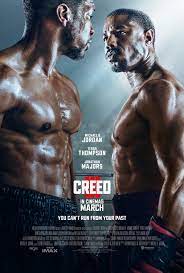
CREED III
US, 2023, 116 minutes, Colour.
Michael B.Jordan, Tessa Thompson, Jonathan Majors, Wood Harris, Mila Davis-Kent, Phylicia Rashard
Directed by Michael B Jordan.
Creed III already. We now have a Creed franchise. And, of course, we remember that this is the continuation of the Rocky franchise, in fact, the ninth film. There is an acknowledgement of this in some remarks during this film about Rocky and the battle with Apollo Creed. And Sylvester Stallone himself receives credits, as a producer, and “based on characters created by”. And, we remember that in the first Creed film, Rocky was Adonis Creed’s trainer.
With the background established, how does the present film go? A thumbnail review would read: what the audience expected, what the audience gets.
By now, Adonis, Donnie, Creed has established himself as world champion. And, as played by Michael B.Jordan, a very sympathetic character whom we have cheered on. Some years have passed, his running a gym, successful, wealthy, living in a mansion, sponsoring for big companies (a huge billboard with him wearing Ralph Lauren clothes – Ralph Lauren supplying his wardrobe for the film!), Happily living with his composer, music-producing wife, Bianca (Tessa Thompson appearing again) and their little daughter, Amara, sweetness and light but also packing a heavy punch, her father’s daughter. She is hearing-impaired so there is a lot of signing as parents communicate with her and she responds to them.
There is a flashback near the beginning, Donnie as a 16-year-old, getting out of his mother’s house at night, accompanying his friend Dame, to an underground boxing bout, Dame winning the Golden Globes competition by knockout. But, before returning home, he is confronted by a figure from the past and punches him out. The sequence will be later explained and amplified with its consequences.
But, in the present, all is well except that his mother (TV veteran Phylicia Rashad), has had a stroke and her health precarious despite her determination.
Then, one day, Dame reappears after 18 years in prison, Donnie not immediately recognising him. There are the tensions from the past, Dame in prison, Donnie escaping and despite Dame writing letters, no response from Donnie. So, some scenes of re-establishing contact, visits to his home, a social at a record label party…
But, Dame has not lost his ambitions, wanting a tilt at world heavyweight champion, challenging Felix, Hispanic boxer, urge upon by determined mother, who trains with Donnie and Duke (Wood Harris). So, then we know where the film is going, what we expect and what we get.
Lots of collages of training after Dame wins the world title, confronting Donnie, and, the preparations for the final confrontation. And, since Donnie is in Los Angeles and not in Philadelphia like Rocky, he runs up the Hollywood Hills, above the Hollywood sign and bellows loudly.
Jonathan Majors is Dame – coming just after his persuasive turn as Kang in Ant Mand and the Wasp: Quantumania.
So, this is definitely a film for boxing fans, with some human interest throughout as well as the dramatic challenge. The climax, is again of course, the final confrontation, filmed realistically, sometimes surreally with the auditorium empty, the boxing ring seeming to float on clouds.
Where to? How can they invent Creed IV, after this episode ends with a humane touch and possible reconciliations.
- Heritage of the Rocky franchise? Now the Creed franchise? This film presupposing its predecessors, characters, story, boxing, Championships?
- The Los Angeles setting, the city, the poor neighbourhoods, the contrast with mansions, the gym, auditoriums for championships? The surroundings of Los Angeles? The musical score?
- Audience interest in Adonis Creed? Son of Apollo Creed? The background of his mother and her relationship, separation, forgiveness? As a teenager, his friendship with Dame, getting out of the house, carrying the gloves, the Golden Gloves fight, the confrontation with Leon, the back history of violence, bashing Leon, the audience later seeing Dame with the gun, the arrest, Donnie fleeing?
- The transition, Donnie and his achievement, world champion, running his gym, the collaboration with Duke, the sparring at the gym, Felix, tough, his mother urging him on, Donnie’s new life? Wealth? Comfortable?
- Bianca, the years of marriage, devotion to Donnie, her work as a record producer, the scenes of composition, supported by Donnie, the love for their daughter, hearing impaired, the sign language, the affection, Donnie and the tea party, Amara and the fight at school, bullied, Bianca’s reaction, Donnie’s reaction to urge her to fight to defend herself?
- The arrival of Dame, 18 years in jail, Donnie not recognising him, the past history, going for something to eat, Donnie offering money, Dame’s reaction, his past career, skill as a boxer, knockouts, his wanting to have a chance at a world title? Donnie’s hesitation? Duke and advising against it?
- Dame, going into training, the severity of the training? Donnie and his help, Bianca and her friendship, his visiting the house? At the Label Party? The preparation for the bout?
- Drago, to fight with Felix, his injuries and the attack, Felix wanting to fight, the discussions about Dame, his mother, the press conference, the agreement?
- The fight, the crowds, Dame and his aggression, Felix fighting back, Donnie and the reaction during the fight, the knockout? Dame and his achievement?
- Donnie going to see Dame, his crowd, his reaction against Donnie, bringing up the past, 18 years of envy of Donnie’s life and career? His future?
- Donnie, the dilemma, the decision to fight, going on the TV program, Dame phoning in, the announcement?
- The background of the Rocky style, this training scenes, to the top of the Hollywood Hills, the Hollywood sign, his shout?
- The fight, the crowds, Donnie in white, Dame in black, his assertiveness? The drama of the fight, the surreal scene, the ring on the clouds, the empty auditorium, the passing of the bouts, round 12, the drama, the advice, Donnie and his past achievement, tactics, knocking Dame down?
- The triumph, Donnie’s world champion again, going to the room, talking with Dame, apologies all round, a kind of reconciliation?
- Donnie with his family, with Ama in the ring, the future?
Shotgun Wedding/ 2023
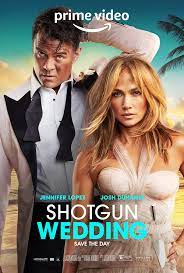
SHOTGUN WEDDING
US, 2023, 100 minutes, Colour.
Jennifer Lopez, Josh Duhamel, Cheech Marin, Jennifer Coolidge, Sonia Braga, Lennie Kravitz, Darcy Carden, Kelly Hernandez, Steve Coulter.
Directed by Jason Moore.
What one might call an undemanding comedy, a variation on romantic comedy themes. Will entertain audiences who want something light and easy, will have its good points and low points for those who like romantic comedies, will not satisfy audiences who are demanding.
On paper, there are number of interesting and potentially entertaining ideas. What about a couple who lived together for a long time and decide to tie the knot, she not wanting any elaborate or traditional wedding, rather wanting to elope, he, on the other hand, wanting the perfect wedding, and spending a long time in meticulous planning? And, a different setting? A luxury island in the Philippines and resort – and then adding a popular ingredient for disturbing the wedding, local pirates? Whole lot of comedy situations between bride and groom, some clashes between family members, some comedy in their portrayal, and a whole lot of action, machine guns, shot guns, the party held as hostage (and keeping them for the major part of the film standing in the swimming pool), the bride and groom going on an adventure escapade, actually cause a body count, and a betrayal twist with the guests?
And, on paper, what about the cast? Jennifer Lopez has been reliable for over 20 years for this kind of romantic comedy, she can be relied on. What about the leading man? The decision was made for Josh Duhamel. He is better known for action dramas. And, as it turns out, the way his character is written is a mixture of the perfectionist and the dill. She is good but he is hard to accept. The final credits note that one of the producers is Ryan Reynolds – and, what a pity that he did not take the role, able to combine the serious and the silly in a convincing way. And singer, Lennie Kravitz, turns up as an ex-boyfriend and unwanted guest.
But, there is an interesting supporting cast, Jennifer Coolidge has been popular for comic roles even before the American Pie films but has consolidated her reputation with her presence in and awards in The White Lotus. And she doesn’t disappoint here. Sonia Braga, on the other hand, was a Brazilian bombshell in the past – here, more than looking her age, she proves quite a contrast. And there is Cheech Marin, memories of his comic roles, Cheech and Chong.
So, quite a lot of screwball comedy routines, some amusing dialogue, especially for Jennifer Coolidge, quite a whole lot of action, Jennifer Lopez getting an opportunity to perform like an action hero, some spectacle at the resort (and hoping that all the extras were paid a bit extra for having to stand in the swimming pool for so long), some unbelievably horrible villains and their disguises, and a betrayal which many would have picked long before it was revealed.
As said, undemanding.
To Leslie
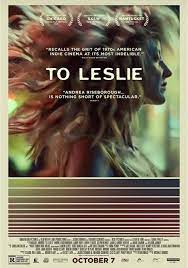
TO LESLIE
US, 2022, 119 minutes, Colour.
Andrea Riseborough, Marc Maron, Andre Royo, Alison Janney, Stephen Root, James Landry Hebert, Owen Teague.
Directed by Michael Morris.
How far is down? How far down does one have to go before the possibility of looking up with some kind of hope is possible? This is the experience of Leslie in this portrait of a reckless alcoholic mother.
Andrea Rieborough received an unexpected Oscar nomination for her performance as Leslie. It is certainly a worthy and powerful performance. A British actress who has had some success in the United States, she becomes Leslie.
The setting is Texas, one of those towns out in the empty spaces, touches of the wild west, the bars, like years, drugs, tough attitudes towards life. And Leslie is part of it. When she wins the lottery unexpectedly, she is wildly excited, a glimpse of her young son who would like some kind of home – and then suddenly, the screenplay goes to “six years later”.
During the credits there is a range of photos of Leslie, indicating some ups, but some downs as she grows older, grimmer, thinner, rather haggard – and, as we meet her again, she is desperate, kicked out of a motel, drinking, hunkering down outside a store sheltering from the rain. How are we going to respond to Leslie? Not very sympathetic in her down and out condition.
There is one sign of hope. She tracks down her son James, now 20, disappointed in her but still loving her, taking her to his apartment, urging her to have a plan, but she lies to him, drinks, and James finds that he can do nothing to help her, phoning her sister and appealing for help.
Her sister is no help, neither is her bikie boyfriend (interesting roles for Alison Janney and Stephen Root). There are recriminations about the past. And, Leslie’s behaviour and drinking continues at the local bar.
Just as the audience is despairing that anything good can happen for Leslie, she encounters Sweeney (a very engaging performance by Marc Maron), working at a motel, who out of some kind of initial compassion offers her a job cleaning the rooms. Audiences can identify with Sweeney, perhaps much more empathetic towards Leslie than we the audience might be, especially if this were real life and our experiences. Sweeney works for his friend, Royo, who had inherited the motel but was a spaced out addict in the past.
Once again, ups and downs, Leslie inconsistent, actually good at cleaning, but unreliable. Yet, Sweeney has compassion for her. A dramatic episode highlights difficulties for Leslie in the town, Sweeney taking her to the fair, with his daughter and her little girl, moments of happiness, but then taunts from the townspeople, sending children to ask embarrassing questions about her past and the lottery and squandering the money. Is there no hope?
In fact, the film is not a despairing one, not a character going into the depths and stuck there, destroyed. Audiences will be moved by the final sequences, what Leslie does with the help of Sweeney and Royo, and some final moments of truth – and love.
- The title, the focus on Leslie, her life, hardships, disappointments, self-destructive behaviour, opportunities, success and failure, some final hope?
- The Texas setting, the towns, apartments, homes, streets, bars, the motel, the diner? The musical score?
- Andrea Riseborough’s performance, Oscar-nominated, awards?
- The credits, the photos of Leslie, her winning the lottery, her son’s birth date, the crowds, on TV, her shouting exuberance, asked about plans, the presence of her son, wistful?
- The six years transition, discovering Leslie again, at the motel, bag outside the door, being kicked out, not being helped by anyone? Sitting in the rain? Her drinking?
- Her son arriving, after six years, 20 years old, taking his mother, to his apartment, introducing his friends, setting her up, giving up his room, his ground rules, no drinking? Her agreeing, yet going out, stealing the money, from his friends, the return, James trying to help her, socially? Her lies, his giving up? Contacting Nancy?
- James putting Leslie on the bus, arrival in the hometown, Nancy’s boyfriend picking her up, going to the house, their condemnatory attitudes towards her? Scoffing at her, the lottery, losing all the money, drinking and drugs? Her disappearance?
- Leslie in town, going to the bars, the drinking, the encounters, the pickup and the sexual attack, her escaping? Later talking to the sympathetic man at the bar? Asking him what he saw in her? Down and out, in the old shed which was the diner?
- The encounter with Sweeney, his finding her, telling her about the phone calls for a job, her bad reaction? Her offering the job, the terms, the room, her wanting the advance, his agreement?
- Sweeney, his back story, ex-wife and her drinking, his daughter, granddaughter, going to visit? His jobs, his friendship with Arroyo, Royo and his past, the drugs, inheriting the motel, offering Sweeney the job?
- Leslie, her work, good at cleaning, yet initially unreliable, sleeping in, hangover? Discussions with Sweeney? Her going to the bar, drinking, encounters? Nancy and her boyfriend, at the bars, nasty comments, belittling Leslie?
- Sweeney taking her to the fair, her unwillingness, the family and their taunts, Leslie bonding with Sweeney’s granddaughter, the games of the fair, dancing with Sweeney, the children asking questions about the lottery, their questions, mockery? The fight with Pete? Leslie leaving?
- Going to the bar again, the man and his approach, her asking what he saw in her? The consequences? Going to the wreck of the diner?
- Sweeney, driving around, his search for Leslie? Royo and his behaviour, the dancing and stripping in the field? Sweeney finding Leslie?
- Leslie, a decision, determination, the plan to rebuild the diner, money issues and Sweeney’s agreeing to help, the sequences of rebuilding and equipping the diner, the 10 months passing? Ready to open, no customers, Nancy’s arrival, her apology for not helping Leslie in the past, Leslie apologising, mutual forgiveness? Nancy bringing James, his coming into the diner, reconciliation with his mother, hugging, preparing to have the meal? And the happiness for Leslie, James – and Sweeney and Royo?
- An out of the depths with glimmers of hope kind of film?
Reminiscence
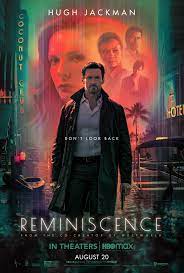
REMINISCENCE
US, 2021, 115 minutes, Colour.
Hugh Jackman, Rebecca Ferguson, Thandiwe Newton, Cliff Curtis, Marina de Tavira, Daniel Wu, Mojean Aria, Brett Cullen, Natalie Martinez, Angela Sarafyan.
Directed by Lisa Joy.
Reminiscence is a complicated/complex adventure drama, thriller.
The most striking thing about the film is its science-fiction plot, the future where technology allows people to read the minds of others. But, this is the basis for a film noir thriller, especially with its femme fatale, her seduction of the leading character, her treacherous behaviour, her lies, her trying to make good what she has wrought.
Visually, the film is quite arresting, the future, the technology for reading minds, the techniques for dramatising the memories. Often it is very dark.
Hugh Jackman is the central character, involved in reading minds, tangling complexes because of what he sees, especially in clients who come to him for help, especially a woman, played by Rebecca Ferguson, with whom he falls in love, is mystified by her, delves into her past, and is ultimately betrayed by her. All the time he is working with his associate, played by tending we Newton, who is more alert to people’s characters than he is.
This is something of a post-apocalyptic America, San Francisco flooded, a visit to New Orleans, criminal behaviour, drugs, nightclubs… And a chief dealer played by Cliff Curtis. (Which means none of the four central characters played by Americans.)
The further the plot develops, the more complicated, especially in the dealings with femme fatale, the setup for seduction of the leading man, and dealings with a successful businessman, his wife his mind has deteriorated, his son, issues of inheritance.
It is surprising to find that the film did very poorly at the box office – but it was released in severe covert lockdown times.
- Science-fiction? Science fantasy? The future?
- The technology, memories and reminiscences, going back, the bath the conditions, hypnosis? The visualising of the memories, dramas, others entering and leaving the reminiscences? The plausibility of this technology?
- The future, Miami, the background of the war is, global warming, flooding, water in the city, the streets, surrounded by water? The visuals of this futuristic Miami, exteriors, the interiors? The visits to Louisiana, the city, drug areas? The musical score?
- The complexity of the plot, echoes of such films as the Matrix? The aspects of the noir thriller, the hero, obsession, the femme fatale, her background, love, deception?
- Hugh Jackman as Nick Bannister, age and experience, his skills with the reminiscences, working with Emily Watts? The collaboration for a long time? The authorities, the DA and her wanting information from a criminal’s reminiscences? Nick’s personal life, non-existent? Solely in his work?
- The character of Emily Watts, her history, the war, fighting, her daughter, alienation from her daughter? Working with Nick the years? Suspicious of his obsession? Collaborating with him, not giving him full information at times? Her wariness about Mae? The end, saving him when he was being drowned, her skill at shooting, the criminals? His final advice to her, to seek her daughter again? Her allowing him to go into the water, to spend the rest of his existence with reminiscences? But her reconciliation with her daughter?
- The complexity of the screenplay, the present, the reminiscences, the range of the past, the various tracks of the past, interconnections, characters interconnecting, the truth about Mae, deceptions?
- Mae, glamorous, coming for a session, her lost keys? Nick and his attraction? Emily and her suspicions? Her experiences and reminiscences, Nick and his infatuation, the collage of times with her, happiness for them both? The disappearance?
- Nick, his quest and obsession, finding the drug dealer in Louisiana and his reminiscences? Tracking down Booth, booth and his evil, discovering the relationship with Mae?
- Mae, prostitute background, her singing in the clubs, singing Where or When (and its recurrence throughout the film, from the wars, in Nick’s life, its use? The complexity of Mae in his life, the various stages, prostitution, the drugs, her becoming an addict? And Nick’s horrified reactions?
- The gradual revelation of her love for Nick, becoming involved in the Sylvan case, the young woman and the birth of her son, Mae rescuing the son? Sylvan, his wife, previous client, reminiscences, something going wrong? Her reappearances in the reminiscences, her relationship with her son, his greed, murders, the confrontation with Nick, the challenging him to kill himself, his mother saving him?
- Booth, his scars, having to relive the attack by the drug dealers, his being burnt, re-experiencing this as he reminisced?
- Booth and Mae, Nick entering the reminiscence, her talking to him and to Booth at the same time? The decision, taking the drug, killing herself?
- The effect on Nick, taking responsibility for the death of Booth, the authorities, interning him, allowing him to stay only with the reminiscences? But his going into the bath for the rest of his existence? The glimpse of him going grey, older, the older Watts and her daughter?
- The ambition of the ideas, the screenplay, success on streaming channels, but failure in cinemas?
Aftersun
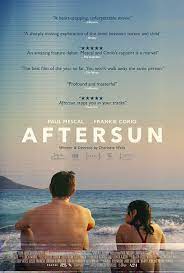
AFTERSUN
UK, 2022, 102 minutes, Colour.
Paul Mascal, Frankie Corio.
Directed by Charlotte Wells.
Aftersun has won many awards and great critical acclaim. However, it should be said that this is a film for an arthouse audience, an audience who wants to contemplate the themes that are dramatised as well as explore the characters. It is not a conventional drama and certainly not an action show.
Irish actor, Paul Mascal, won awards for his performance in the series, Normal People. He received an Oscar nomination as Best Actor for his role here, as Callum, verging on his 31st birthday, separated from his wife but friendly, taking his 11-year-old daughter for a week’s holiday to a resort (very British and filled with British tourists) in Turkey.
However, the audience is jolted right from the beginning with a lot of handheld camera work, and some swirling collages of images. And, while the pace of the film settles down, there are glimpses of video of father and daughter, of some flashbacks, and, some flash forward to the present. The action takes place mainly in the late 1990s.
Callum is very agreeable with his daughter and she with him. However, as the film progresses, we realise that Callum is frequently depressed, some moments with a gloomy expression, sitting silently, sometimes weeping, seen going into the ocean at night and submerging himself. But, he wants to relate well to Sophie (a very bright and active performance from Frankie Corio). He suggests all kinds of activities each day, the pace of the film being day by day of the holiday, some audiences may be envious of the holiday, others wishing that it would, perhaps, get a move on. There is swimming, there are meals, there is scuba diving, there is the pool table, at which Sophie is adept.
So, the film, the first by director, Charlotte Wells, who wrote the screenplay, reminiscing about some of her past, gives us often detailed portrait of father and daughter, but the father remaining somewhat enigmatic.
At the end of the film, we realise that the daughter, 20 years later, her father’s age during their holiday, is remembering, looking at video footage, interpreting.
A number of commentators have suggested that there is a gay subtext to the film, that Callum may be a gay man, the separation from his wife, wanting to set up a business with a friend, and they list various hints throughout the film of something of his gay gaze. And, perhaps, he has AIDS. Some other reviewers and commentators have written developing this theme as well as indicating how depression rather than sexual orientation is the theme. In interviews, Charlotte Wells herself has not indicated the gay subtext.
With these interpretations, it means that Aftersun is a film to be mulled over after the audience has seen it.
- Awards and critical acclaim?
- The setting, the end of the 20th century, the Turkish resort, filled with British tourists, the accommodation, the pool, the attractions and entertainment? Karaoke, scuba diving…? The musical score and mood?
- The story from Sophie’s perspective, in her 30s, remembering her father? Real and imagined? The adult Sophie, her situation, the same age as her father in her memories?
- Sophie, 11? Her parents separated, living with her mother in Glasgow, her father in London? Contacts? Going on holiday with her father, travelling the bus, the arrival, the accommodation, settling in? The beds and the room? The video, the clips with her and her father? The different situations? And kept for her memories?
- Calum, turning 31, his marriage, separation, phone calls with his wife? His relationship with Sophie, wanting to become important in her life, the holiday together? His cheerful attitudes, yet his moments of depression, the smoking, walking into the ocean and submerging, lying on the bed, weeping…?
- The happy sequences of father and daughter together, day by day, meals, swimming, the club, the entertainment, the karaoke (and his refusing to participate), the scuba diving and Sophie losing the helmet, time together?
- Sophie, her age, looking at the tourists, the boys, the game of pool and her skills, friendly, joining with them later, the boy her own age, the driving game, later meeting, talking at the pool, the kiss? Sophie on the verge of coming of age and adolescence?
- The portrait of Sophie, an exuberant young girl, her life, wanting to know her father, the experience of the holiday together? Leaving him behind? 20 years later and the footage?
- The portrait of Calum, father, the touches of depression, the scenes of the nightclub, the lights and the dancing, his farewell to Sophie, in going through the doors into the club?
We Have a Ghost
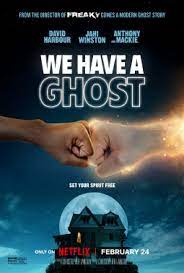
WE HAVE A GHOST
US, 2023, 127 minutes, Colour.
David Harbour, Jahi Winston, Anthony Mackie Erica Ash, Tig Notaro, Niles Fitch, Isabella Russo, Tom Bower.
Directed by Christopher Landon.
Most audiences enjoy a ghost story, especially if it has touches of humour. After all, Casper the friendly ghost was very popular. And, back in the days, there were some ghost classics including in the 1930s, The Ghost Goes West, with Robert Donat, and in the 1940s, The Canterville Ghost, with Charles Laughton – and a remake later with John Gielgud.
Now we have a rather 21st-century ghost. But, not so much to be afraid of, rather to enjoy – and the mocking of our social media audiences who are eager to grab onto any sensation and conspiracy. But, something of a warning, it does become quite a grim in the explanation of who the ghost is at the end.
We see a family fleeing from a house and the lights going off. Then we see an over-exuberant estate agent, played by Faith Ford, doing an oversell of the rather ramshackle house and its interior ruins, wondering why this African-American family would actually buy it. In fact, the father wants to make a new beginning – one of several new beginnings. He is played by Anthony Mackie, rather a long way from the Marvel Universe, looking and acting very much like Will Smith. Erica Ash is his devoted wife, through thick and thin, Niles Fitch an older adolescent son, fixated on his phone, and the younger son, Kevin, played by Jahi Winston, sullen, listening to music, sitting in the car, refusing to get out until his father commands him.
And Kevin turns out to be the hero of the film, going around the house, exploring mysterious sounds, and seeing Ernest, the rather transparent, somewhat dishevelled middle-aged ghost, played entertainingly by David Harbour. He tries to frighten Kevin who rather laughs, films him on his phone. Soon enough, dad and the other son see Ernest, filming him, and especially filming the mother screaming in fright as Ernest moves through her to in front of her! Dad thinks this could help the family finances, goes online and creates quite a sensation, fans absolutely galore, the media, crowds at the house, and a medium, played in her usual humorous way by Jennifer Coolidge.
But, there are suspicions, especially from a former CIA agent, played by Tig Notaro, who is suspicious, wants to bring the CIA into the investigation.
So, lots of humour, adventures, Kevin and the young girl next door who is a whiz at the computer finding out all kinds of information, getting documents, taking the road to discover who Ernest really is. Persuading Ernest eventually to come out of the house – and pursued all around the streets by the fans. Fortunately he go can go through walls. They can’t (although some fans actually try at bashing themselves against walls!)
There are police, car chases, CIA investigators, weapons, capturing Kevin and the family, interrogations…
Kevin also finds the friend of Ernest and uncovers quite a sinister story leading to the villain fighting the family but, of course, Ernest turning up.
Family-friendly.
- The title, expectations? But a family-oriented film? For the teenagers to identify with?
- The cinema tradition of friendly ghost, the Canterbury Ghost, Casper? A variation on the theme?
- The opening, the house, looked at from a distance, light on, the family fleeing in the car, lights off?
- The transition to the Presley family, the hectic sales pitch from the estate agent, concealing the realities? The house and comparative ruins? Why the family are buying it? A new start? Frank, his quests in life, failures, starting again, his wife, devoted to him, Fulton, teenager on the phone, Kevin, sullen teenager, listening to music, refusing to get out of the car, carrying in his boxes? His exploring the house?
- The settling in, Kevin and his experience, Ernest appearing, ghostly, trying to frighten, Kevin laughing? Filming the experience? The bond between the two, earnest, physical appearance, ghostly appearance, unable to speak, unable to remember, unable to be touched, but yet able to touch?
- Frank and Fulton, seeing Ernest, the filming? Putting it on social media? Especially the scene where mother discovers Ernest and screams? The increasing number of followers?
- The background, the agent, her task, sacked from her job, learning about Ernest, going to the CIA head, commissioned, her personality, reading to the small crowd on the bookshop, autographs? Coming to the house, the confrontation with the family?
- Joy, next door, making friends with Kevin at school? Her continuing friendship, travelling with him, the library, her skills with IT, getting the information? On the road, the adventures, the climax? The CIA agents finding them?
- Audience sympathy for Ernest, his not knowing who he was, touches of memory about his daughter? The media, everybody at the house, Frank and the publicity, the deals with the media, for financially saving the family? Everybody wanted to see Ernest? The television set up, everybody impatient, Judy Romano, medium, getting ready, make up, Jennifer Coolidge comedy? Ernest coming into the room, frightening everybody, mayhem? Kevin enjoying it?
- The need for Ernest come out of the house, persuading him, tentative, enjoying being outside, the fans seeing him, the pursuit and chase, his being able to go through the wall (and the satire of fans trying to imitate him and bashing against the wall)?
- The decision to find Ernest background, the diner, the waitress and to giving the information in the photo? The police in pursuit, the television news about those fleeing, the family interned? The comedy of the car chase and Ernest moving from car to car?
- The arrival of their destination, the house, the man, his explanation about Ernest’s grief, death of his wife, birth of the daughter, their decision to look after the daughter – and is visualised, the sinister look on the mother as she took the child?
- The dramatic change, the man, killing Ernest, digging the grave, burying him?
- The CIA arriving, their weapons, taking Kevin and Joy, controlling Ernest, imprisoning him? Interrogations?
- Louise, praised, satisfied, her suspicions of the head, change of heart, letting Ernest go?
- Kevin, at home, sad, the arrival of the man, the confrontation with Frank, Fulton and Kevin? Ernest arriving in time, overcoming his killer?
- The family settling down, Kevin and the tentative relationship with Joy? The future of the family?
Matrix, The
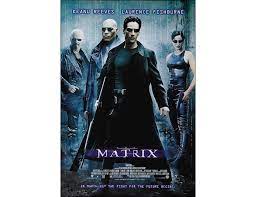
THE MATRIX
US, 1999, 136 minutes, Colour.
Keanu Reeves, Laurence Fishburne, Carrie-Anne Moss, Hugo Weaving, Gloria Foster, Joe Pantoliano, Belinda McClory, Paul Goddard, Robert Taylor.
Directed by the Wachowski Brothers/Lana Wachowski, Lilly Wachowski.
With the release of The Matrix in 1999, audiences both young and old responded to its exploration of the relationship between humans and modern technology. Philosophers around the world hurried to write articles for academic journals on how it raised the problems of what is real, what exists only in the mind and the possibilities of co-existing dimensions. Noted Catholic Polish director, Kzrystoff Zannussi, a member of the Vatican's Council for Culture was of the opinion that the film was a contemporary masterpiece and that people should see it, not only because of its extraordinary special effects but also because of its intellectual stimulus.
The Matrix offers a world where human-created computers and machines now hold the humans to ransom and who burrow through the earth to destroy them and their refuge city, Sion, can only be saved by Neo, an anagram of the One.
The Matrix trilogy introduced Neo as a Saviour-figure, someone human (or programmed like one) to be the means of saving the human race. In death and resurrection imagery, he was killed and then loved back to life by the warrior, Trinity. In Matrix Reloaded, the saviour role of Neo is developed but left in abeyance until Revolutions. By Matrix Revolutions, Neo is still the Saviour-figure par excellence, referred to by his enemy, Bane, as 'the blind messiah'. In apocalyptic imagery, with overtones of biblical battle imagery, he saves the bereft humans in the city of Sion and confronts the Satan-figure, Mr Smith, and is seen, arms outstretched as on a cross. His blinded eyes see an internal vision, glowing beauty, a kind of 'beatific vision' which culminates in his final apotheosis.
While the Wachowski Brothers drew on all kinds of popular sagas and mythology, their use of names with Christian-overtones for their characters as well as imagery that is familiar from biblical stories, mean that there can be fruitful dialogue between the movie and the scriptures.
The descent of Jesus into 'hell' or 'hades' or 'to the dead' is an article of the Apostles' and Nicene Creeds. Speculation in the early decades of the Church are echoed in references in Matthew's Gospel, the letter to the Ephesians as well as the suggested readings from John and I Peter. The tradition suggests that, while Jesus died for all, his death led him first to be associated with those who had gone before and were waiting to rise to new life with him.
The Jewish scriptures are full of battle imagery where God conquers the enemies of Israel as they do battle with their foes. It is useful to read chapters 38 and 39 of Ezekiel, the chapter of Armageddon, so beloved by fundamentalist and rapture Christians. Gog of Magog has a plan to destroy Israel but is no match for the power of God. God's warnings are given through the prophet. Perhaps the Wachowskis know Ezekiel. However, the machines are like Gog, overwhelming forces for destruction. The warriors of Sion are like the harassed people of Israel. Like Ezekiel, there is an Oracle who prophesies and guides, especially to lead the hero, Neo. These biblical battles provide a context for Jesus' descent to the Dead.
Since Neo is the saviour, he is pictured in Matrix Revolutions going down into his own 'hell'. He is betrayed by Bane, blinded by him. But his inner vision leads him to guide Trinity above the machines to a safe vision of clear and beautiful skies before he descends to do battle with Mr Smith. Part of his 'hell' is the sacrificial death of his beloved Trinity. As the power of megalomaniac Smith (Satanic in its delusions of grandeur) seems to conquer him, he goes into a grave before he regains the strength (with the images of Neo, arms outstretched) to finally defeat Smith.
Of course, many viewers will look at The Matrix trilogy as exciting science fiction or futuristic fantasy. Some will respond, according to producer, Joel Silver, just on the visceral level. Others will respond to the mythic layers. A Catholic response will explore those mythic levels and discover the links between the scriptures, Jesus of the Gospels and the religious symbols. For audiences who are not sure of their faith or their biblical knowledge, the films provide aspects of a new apologetics, a contemporary invitation to examine the credibility of the Catholic tradition.
Much of the production of The Matrix took place in Sydney. While Keanu Reeves had a strong reputation prior to this film and its sequels, it made him something of an icon. The film had a strong supporting cast led by Carrie Ann Moss and Laurence Fishburne who appeared in the later films. There is also an Australian cast, led strikingly by Hugo Weaving as the sinister, dark glasses-wearing, Agent Smith.
See the discussion material for the sequels, Matrix Reloaded, Matrix Revolutions and the 2021 Matrix Resurrections.